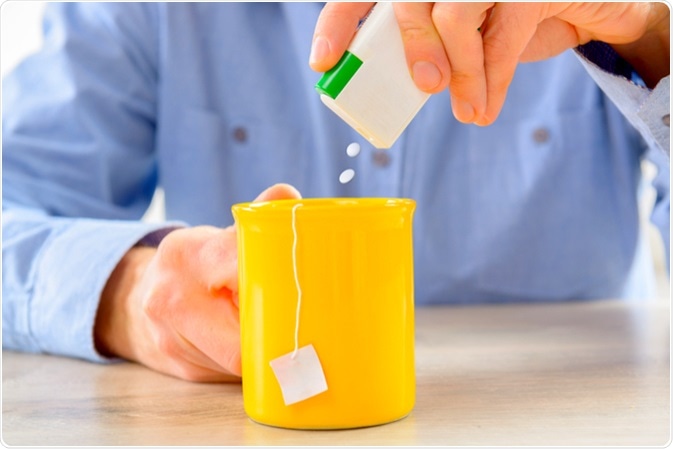
Safety of Sugar Substitutes / Artificial Sweeteners
By Jeyashree Sundaram (MBA)
Artificial sweeteners are man-made sugars that add a sweet taste to food and beverages and are used as an alternative to ordinary sugars. They are commonly used in food industries in the preparation of milk products, drink mix powders, processed foods, and other foods and beverages. They are also considered for use at home in cooking and baking.

Image Credit: Monika Wisniewska / Shutterstock
Artificial sweeteners are classified into two types:
- Non-caloric sweeteners—these do not add calories to the diet. They are artificially derived from natural sugars. The commonly used non-caloric sweeteners are saccharin and aspartame.
- Sugar alcohols—these are non-alcoholic and they have the same amount of calories as that of natural sugars. The commonly used sugar alcohols are sorbitol and mannitol.
Artificial sweeteners approved by the Food and Drug Administration (FDA) are saccharin, sucralose, aspartame, acesulfame-K, neotame, and tagatose. FDA unapproved sweeteners are alitame (Aclamate) and cyclamate.
Health Benefits of Artificial Sugars
Artificial sweeteners are non-nutritive, have a negligible level of calories, do not raise the calorie levels in the body, are sweeter than ordinary sugar, and do not increase blood glucose levels due to absence of any form of carbohydrates. They also prevent formation of tooth cavities and tooth decay.
They prevent secretion of excess insulin in patients with reactive hypoglycemia; this may reduce the blood glucose to a level below the minimum quantity required by the body to perform physiological operations.
The other health advantages of consuming artificial sugars are as follows.
- Saccharin is an important sugar substitute for people maintaining body weight, and its consumption is considered to be healthier compared to use of other artificial sugars
- Sucralose does not affect the level of blood glucose, carbohydrates digestion, and insulin secretion. Experiments carried out on people with normal blood glucose levels and on those with Type1 and Type 2 diabetics showed no change in the short- and long-term glucose levels in blood.
- Aspartame sugar helps people to quench their addiction to sweet foods. It also helps in regulating the levels of blood glucose and diabetics. They are prime inhibitors for the formation of tooth-decay-causing acids. Aspartame is used in manufacturing sugarless chewing gum and is recommended for use after having food.
Health Concerns of Artificial Sugars
In general, artificial sugars are sweeter than ordinary sugar and, therefore, their regular use would lead to modification of the taste buds and can result in yearning for sweeter foods. The University of Pretoria performed numerous researches on artificial sugar consumption. They concluded that excess use of these man-made sugars would lead to several mental illnesses and disintegration of the brain.
Consumption of man-made sugars beyond the Advised Daily Intake (ADI) level would result in health issues.
Studies were carried out on laboratory rats based on the intake of saccharin has revealed growth of bladder tumors, especially in male rats. So the FDA announced a public ban on the use of saccharin. However, later studies revealed that there was no risk of developing tumors in humans and so the ban on the use of saccharin was removed. Consumption of saccharin can also cause various allergic reactions in humans such as headache, breathing problems, skin problems, and diarrhea.
Sucralose is not completely absorbed in the body. About 8% to 20% of the total sucralose consumed is absorbed in blood and excreted in urine. A research conducted by the Scientific Committee on Food (SCF) stated that continuous consumption of sucralose results in increased accumulation of the chemicals in the body that lead to other side effects.
The components of aspartame are phenylalanine (50%), aspartic acid (40%), and methanol (10%). Clinical analysis of aspartame revealed that patients with genetic phenylketonuria (PKU) and liver disease have impaired phenylalanine metabolism leading to accumulation of amino acid in the body, resulting in some allergic effects. The presence of high level of phenylalanine leads to brain damage. Aspartame releases a small amount of methanol in the process of digestion, which is in free-state and it is easily absorbed by the body. Continuous consumption of aspartame will lead to accumulation of methanol in the body, which can cause blindness and even death. Aspartame is also responsible for increased signs of injury and even death to nerve cells.
Neotame is derived from a dipeptide composition of two amino acids: aspartic acid and phenylalanine, and it consists of methanol in small amounts. Therefore, the effect of neotame on human health is the same as that of aspartame.
Tagatose when consumed beyond the advised intake levels can cause diarrhea, nausea, and flatulence.
Overconsumption of sugar alcohols can cause diarrhea, bloating, accumulation of intestinal gas, and the effect of laxation.
Safety of Artificial Sugars
The safety of artificial sugar depends on the amount of intake. Acceptable daily intake (ADI) levels have been determined for each artificial sugar by FDA. These sugars when taken beyond the ADI level can lead to several consequences. So the consumption of these man-made sugars should be kept in control to prevent health problems and other side effects.
Sources:
- https://www.umass.edu/nibble/infofile/artsweet.htm
- www.nhs.uk/Livewell/Goodfood/Pages/the-truth-about-aspartame.aspx
- www.nhs.uk/Livewell/Goodfood/Pages/the-truth-about-sucralose.aspx
- www.nhs.uk/Livewell/Goodfood/Pages/the-truth-about-acesulfame-k.aspx
- http://www.diabetes.co.uk/sweeteners/saccharin.html
- https://www.ncbi.nlm.nih.gov/pmc/articles/PMC3198517/
- extension.arizona.edu/.../az1229.pdf
- www.fda.gov/.../ucm397725.htm
- www.mayoclinic.org/.../art-20046936?pg=1
- connectusfund.org/7-advantages-and-disadvantages-of-artificial-sweeteners
- citeseerx.ist.psu.edu/.../download
- https://sucralose.org/sucralose-benefits/
Further Reading
Last Updated: Feb 26, 2019
































No hay comentarios:
Publicar un comentario